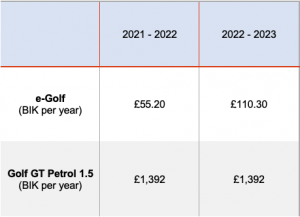Company Car tax on electric cars
The introduction of electric cars into a business or organisation is no longer just about social responsibility. There are several tax benefits to driving an electric car, including some serious financial incentives such as electric car benefit in kind.
As range increases – with many new options offering a range approaching 400 miles, electric vehicles are better equipped than ever to deal with the needs of most day to day business commutes.
The UK government is eager to get organisations thinking about the tax benefits of driving an electric car and have put in place a host of incentives to encourage business uptake. More than half of all cars are registered to businesses on UK roads and as companies begin to wake up to the cost savings they can bring, UK fleet managers are starting to think about the switch to electric.
Tax on benefits in kind for electric cars
Swapping to an electric car can bring huge tax benefits for businesses and this got even better from April 2020. In fact, there are now 11 new tax bands for vehicles with emissions of 75g/km and below, some of which are linked to the electric mile range that the vehicle offers. So, if you’re thinking of choosing a hybrid vehicle for your business then it’s worth investigating electric car benefit in kind 2021 before you choose.
The government has also announced the tax rate for the next three years, helping businesses to plan ahead. The electric car tax on benefit in kind rate will increase to 1% in 2021 / 2022 and 2% in 2022 / 2023.
As an example, take the new e-Golf and compare this to the Golf GT Petrol 1.5:

“Company car tax liabilities on petrol and diesel cars have grown significantly over the last 6 years. A typical business driver could be spending between £300 – £400 a month (for a 40% taxpayer). If the upfront cost of an electric car works for the business buyer then the tax breaks will speak for themselves over the lifetime of the car.”
Harvey Perkins, employment tax advisors, HRUX
Capital allowances on electric cars
Cars with CO2 emissions of less than 50g/km are also eligible for 100% first year capital allowances. This means with electric cars, you can deduct the full cost from your pre-tax profits. On a car costing around £40,000 this could amount to a tax relief of £7,600 in the first year.
Congestion charge exemptions
Do not forget electric cars are also exempt from the congestion charge tax. So, if your company cars are travelling in areas where clean air zones exist or are about to be introduced, then this also adds to the tax savings of electric driving over the year. With the introduction of more and more of these zones planned across the UK this is a great way to think ahead.
The current congestion tax in London costs £11.50 per day per vehicle between 07:00 and 18:00 weekdays.
Road tax on electric cars
Now that vehicle road tax is based on carbon dioxide emissions, pure electric cars are exempt from first year road tax meaning it is free to tax them.
However all cars registered 1st March 2001 and 31st March 2017, with CO2 emissions less than 100 g/km, are not subject to road tax.
For all cars registered on or after 1st April 2017 completely. Fully electric cars have no tailpipe emissions and are therefore still exempt from road tax. However, some plug-in hybrid electric cars with CO2 emissions less than 100 g/km, may need to pay anything from £0-£155 per year depending on the levels of CO2 emissions and this appears to be going up annually.
One thing that many people are not aware of is that all cars registered on or after 1st April 2017 and cost over £40,000, are still liable to pay an additional road tax charge. Electric cars that fall into this category will have to pay £325 per year road tax for the first five years, compared to £475 for petrol and diesel cars registered in the same period.







